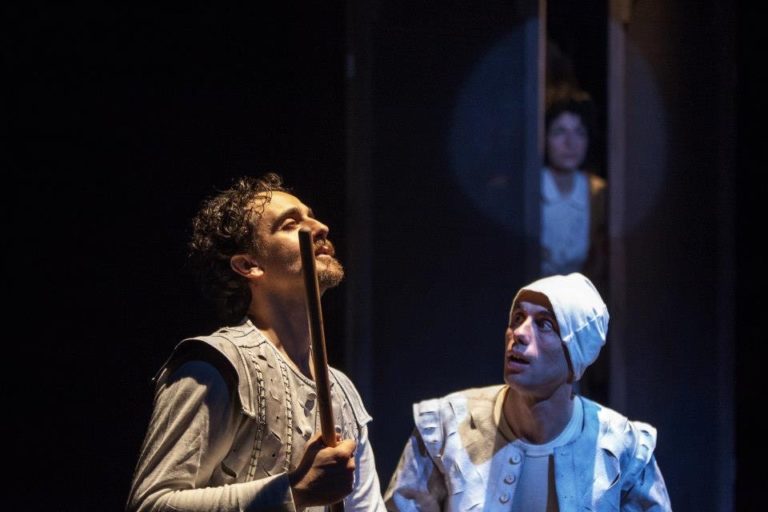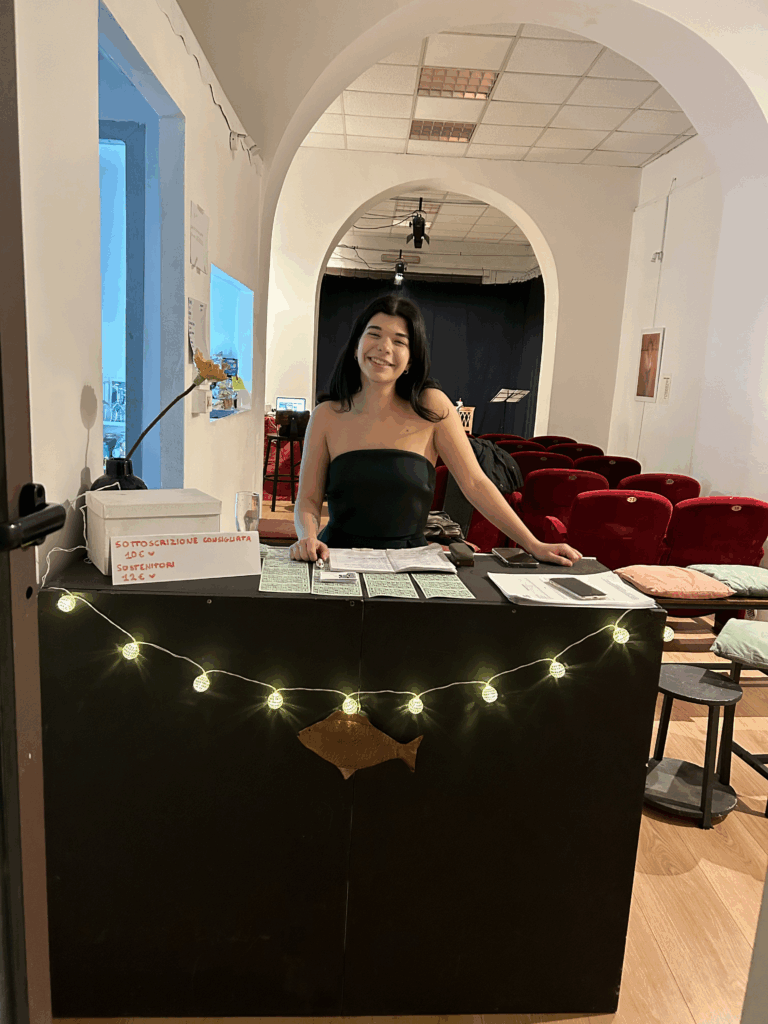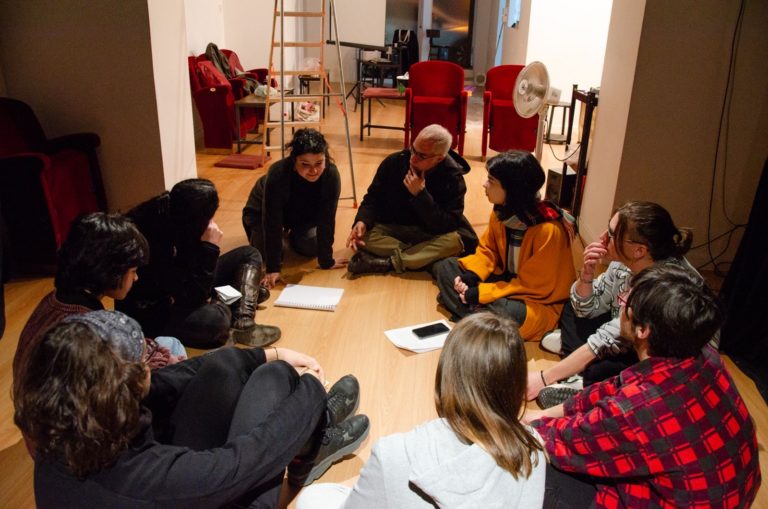A Conversation with Sara Sole Notarbartolo, Taverna Est Teatro
Part. 3 of the series: Daydream
Author: Manon Moulin
Italy’s independent theatre scene often exists in the shadows of institutional giants—underfunded, under-recognised, yet fiercely alive. In this interview, playwright and director Sara Sole Notarbartolo, founder of Naples-based Taverna Est Teatro (TET), speaks about the challenges and urgency of sustaining cultural independence. Through TET, she champions a radical, community-rooted theatre practice that defies market pressures and political constraints, offering a bold look at the systemic gaps plaguing independent cultural work in southern Italy.

Manon Moulin: Can you present yourself as well as the organisation you’re a part of (TET)?
Sara Sole Notarbartolo: My name is Sara Sole Notarbartolo. I am a playwright, director, and theatre educator. I founded Taverna Est Teatro (TET), an independent cultural organisation based in Naples, dedicated to theatrical production, training, and the promotion of artistic projects, often with a strong focus on social issues and local communities.
What is your position within the cultural scene in Italy and more particularly in Naples?
SSN: In both Naples and nationally, TET represents an independent voice in the theatre landscape. We have often collaborated with the city's institutional theatres, such as the Teatro Stabile di Napoli and the San Carlo Opera House. At the same time, we proudly continue to be part of the network of organisations working outside official circuits, striving to offer a theatre that is alive, free, and engaged with contemporary themes.
Can you tell me a bit more about the independent cultural scene in Naples? And about its theatre scene?
SSN: Naples has an extremely dynamic independent cultural scene, often fuelled by the need to compensate for the lack of institutional support. Recently, many small and grassroots theatre spaces have opened—precious venues that have become true centres of vitality, artistic creation, and community engagement.
We ourselves opened Sala Sole, a venue where we produce and host performances from all over Italy. We are also working on a project featuring mise en espace[1] and readings of contemporary plays by authors from various countries. Although we are still seeking funding to fully realise it, we are determined to move forward.
What would you say are the main challenges facing the independent theatre scene in Italy? Are there any specific about its Naples scene (being in southern Italy)?
SSN: The main challenges are definitely financial (lack of funds, difficulty accessing grants) and logistical (very few and now mainly small venues available).
One critical issue is the lack of opportunity for social mobility that would allow independent companies to realise large-scale projects: most grants require a network of acquaintances in the sector and advance funding, meaning only those who already have financial resources can access them.
Naples enjoys a cultural awakening and high-quality artists, playwrights, and audiences. It is a magical, beautiful city. However, there is still a lack of structured economic support for cultural production, leaving artists too isolated despite being vital resources for the territory. In Italy, public support for the cultural sector is divided between the State, i.e. the Ministry of Culture, which gives money to mostly rich companies; the regions (there are 21 regions in the country), which give unspecified contributions—there are calls for proposals from time to time—and the municipalities, which work in the same way as the regions. Usually when you win tenders, you have to put up all the money you need, and then wait for the city, after checking that everything is in order, to pay you back. This system obviously benefits larger, richer companies, and leave independents is tricky situations.
Many initiatives we carry out, particularly those focused on social issues such as our Futura project[2], would easily receive significant funding in other Italian regions, especially in the centre and north—funding that is still unimaginable for us.
How would you define the notion of independence? Any specifics within the theatre sector regarding this notion?
SSN: Independence means having the freedom to choose content, languages, and operational methods without economic or political constraints. In theatre, it also means inventing alternative ways to produce and distribute work, while maintaining strong artistic coherence and a direct connection with the audience.

How is independence central to your activities?
SSN: Independence is the foundation of our work: it allows us to be radical, experimental, to address uncomfortable topics, and to engage directly with our audience, without mediation or censorship.
We often self-produce our shows and earn income only afterward through ticket sales and distribution. This limits us (for instance, we cannot yet afford large-cast productions), but it also allows us to explore themes that no one else addresses because they fall outside official funding priorities or the favoured topics of cultural institutions. In fact, some calls for proposals have a theme linked to the anniversary of the death or birth of famous literary or cultural figures, however, we feel the need to tell stories that are not covered by these calls for proposals. For example, we are currently working on a story about the effects of gentrification in Naples: no call for proposals considers it a fundable topic, both the city and the region are in favour of tourism, which is the accusation of gentrification and the fact that the inhabitants of Naples from the precarious classes are leaving the city.
Moreover, the need to communicate clearly to the public prevents us from being self-referential or creating overly conceptual or elitist productions. As Pier Paolo Pasolini, an Italian intellectual I greatly admire, asserted, every work must be readable on multiple levels. Works made only for small intellectual circles make little sense; it’s vital to care about the content and communicate it to everyone.
How is independence and cultural independence seen/treated in Italy?
SSN: Unfortunately, cultural independence is often poorly supported and sometimes viewed with suspicion—this has been the case for a long time, even more so under our current government. The system tends to favour more institutionalised or already established projects, or those linked to specific circles of power, leaving few resources for those who work autonomously and explore new languages.
What is the state of the solidarity relationships between independent theatre companies in Italy? And in Europe?
SSN: In Italy, there is an informal network of solidarity among independent companies, based on the sharing of spaces, knowledge, and project collaborations. We as TET have collaborated several times with our southern independent peers from Teatro Mediterraneo Occupato in Palermo, Sicily, or from Nostos Teatro in Aversa—we took our shows to them and they took their shows to the Sala Sole. When you go to the north it is different, they have more money, so you usually go with a regular cachet that covers costs and wages.
At the European level, there are more structured cooperation opportunities through international grants and networks, although much depends on the independent organisations’ ability to find the energy and resources needed to participate.
However, the big issue remains: you often need to already have funds in order to access further funding.

Why is it important for you as an independent theatre company to be a part of the Reset! network? Or any network of cultural organisations?
SSN: Being part of a network like Reset! means building alliances, sharing resources and knowledge, and gaining greater strength in dialogues with institutions. For those working independently, it is crucial to feel part of a broader community capable of having an impact and providing mutual support.
Do you want to add something?
SSN: I believe it is essential today to reaffirm the value of cultural independence, not just as a survival strategy, but as a conscious choice to foster critical thinking and new forms of social relations.
Small neighbourhood theatres are places where artists and audiences can meet directly and meaningfully, helping to regenerate the social ties of our cities. It is essential to preserve and support these spaces, as they are the core of truly shared culture.
It is independent realities that renew culture and thus keep it alive.
[1] A mise en espace is a kind of reading of the texts that is done in the theatre, without sets or costumes, just to colour the dramaturgy—the text of a play.
[2] The Futura project is a sentimental education project that uses theatre workshops in schools to talk to teenagers about feelings and gender violence in order to prevent feminicide. TET focuses on children from economically disadvantaged backgrounds, offering free workshops in precarious neighbourhoods, and children with cognitive disabilities.
Published on May 15th, 2025
About the author:
Manon Moulin is the editorial coordinator of all European projects for the non-profit organisation Arty Farty. She specifically works on the European network of independent cultural and media organisations Reset!, as well as the aggregation media We are Europe.